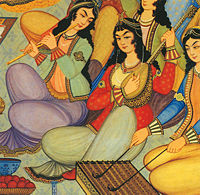High Culture
Introduction, Important Definitions and Related Concepts:
High culture is a term, now used in a number of different ways in academic discourse, whose most common meaning is the set of cultural products, mainly in the arts, held in the highest esteem by a culture, or denoting the culture of ruling social groups.[1][2]
Academia is a collective term for the scientific and cultural community engaged in higher education and research. The word comes from the akademeia just outside ancient Athens, where the gymnasium was made famous by Plato as a center of learning. The sacred space, dedicated to the goddess of wisdom, Athena, had formerly been an olive grove, hence the expression "the groves of Academe". By extension Academia has come to connote the cultural accumulation of knowledge, its development and transmission across generations and its practitioners and transmitters. In the seventeenth century, English and French religious scholars popularized the term to describe certain types of institutions of higher learning. The English adopted the form academy while the French adopted the forms acadème and académie. An academic is a person who works as a researcher (and usually teacher) at a university or similar institution in post-secondary (or tertiary) education. He or she is nearly always an advanced degree holder who does research. In the United States, the term academic is approximately synonymous with that of the job title professor although in recent decades a growing number of institutions are also including academic or professional librarians in the category of "academic staff." In the United Kingdom, various titles are used, typically fellow, lecturer, reader, and professor (see also academic rank), though the loose term don is often popularly substituted. The term scholar is sometimes used with equivalent meaning to that of "academic" and describes in general those who attain mastery in a research discipline. It has wider application, with it also being used to describe those whose occupation was research prior to mass organized higher education.
Academic administrators are not typically included in this use of the term academic. Some sociologists have divided, but not limited, academia into four basic historical types: ancient academia, early academia, academic societies, and the modern university. There are at least two models of academia: a European model developed since ancient times, as well as an American model developed by Benjamin Franklin in the mid-eighteenth century and Thomas Jefferson in the early nineteenth century. In the United States academia tends to be politically progressive with 72 percent of faculty members identifying as liberal (87 percent at elite institutions).[1] Culture (from the Latin cultura stemming from colere, meaning "to cultivate,")[1] generally refers to patterns of human activity and the symbolic structures that give such activities significance and importance. Cultures can be "understood as systems of symbols and meanings that even their creators contest, that lack fixed boundaries, that are constantly in flux, and that interact and compete with one another"[2] Different definitions of "culture" reflect different theoretical bases for understanding, or criteria for evaluating, human activity. Culture is manifested in music, literature, lifestyle, painting and sculpture, theater and film and similar things.[3] Although some people identify culture in terms of consumption and consumer goods (as in high culture, low culture, folk culture, or popular culture),[4] anthropologists understand "culture" to refer not only to consumption goods, but to the general processes which produce such goods and give them meaning, and to the social relationships and practices in which such objects and processes become embedded. For them, culture thus includes art, science, as well as moral systems. Cultural Anthropologists most commonly use the term "culture" to refer to the universal human capacity and activities to classify, codify and communicate their experiences symbolically. This capacity has long been taken as a defining feature of humans. (although some primatologists have identified aspects of culture among humankind's closest relatives in the animal kingdom).[5]
